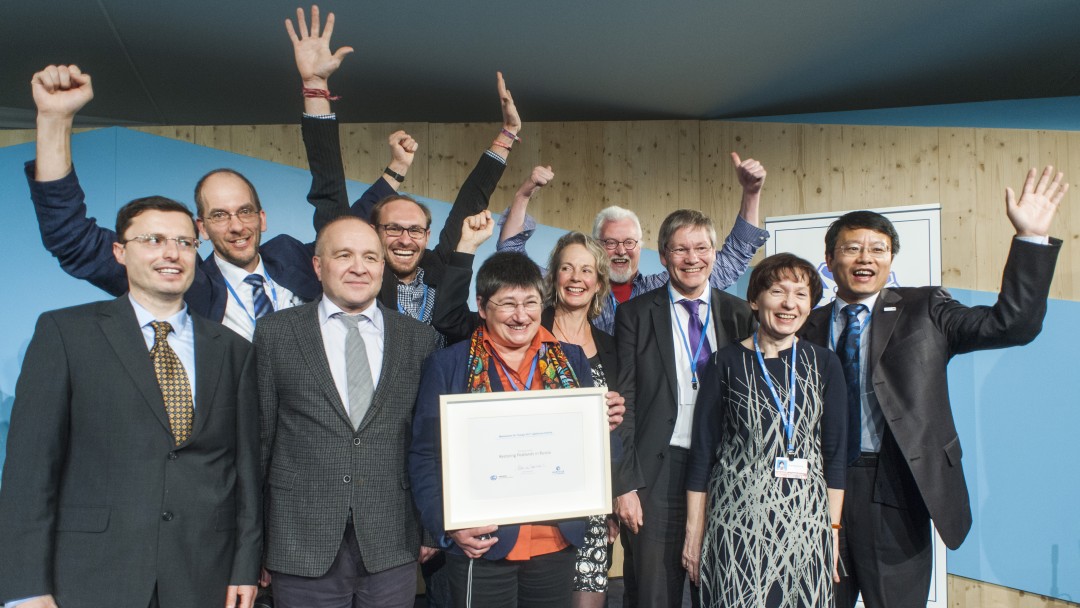News from 2017-11-15 / KfW Development Bank
A triple win for the climate, for the environment and for political commitment
KfW project for rewetting of peatlands in Russia wins award

Can large amounts of carbon be naturally absorbed while restoring ecosystems? The United Nations has awarded a prize to a KfW project that makes this a reality.
The loud murmurs in the fully packed conference hall just before Tuesday’s last event of the day are quickly replaced by silence after the moderator calls for attention: "After hearing a lot about climate policy and the many possibilities for action, it’s now time to award the ones that are at the forefront of fighting climate change." This is equally captured by the Executive Secretary of the UNFCC Patricia Espinosa in her opening speech at the award ceremony: "Climate change is now showing its true face. We can no longer afford to wait."
Among the 19 innovative and inspiring projects to be awarded with the "Momentum for Change Lighthouse Award" by the UN is KfW Development Bank’s project "Rewetting peatlands in Russia, preventing fires and mitigating climate change." Under the management of Frank Mörschel, the project aims at ecologically restoring degenerated swamps. For this purpose, canals that drain the swamps are closed so that the ground and rainwater can remain inside. Many swamps dried up due to the conversion of wilderness into forests or arable land. They thus pose a huge fire risk particularly in the areas around Moscow. A monitoring system that has been integrated into the project will help measure the progress of rewetting in the future.
Prof Dr Joachim Nagel, member of the Executive Board of the KfW Group, underscores the environmental significance of swamps. "They absorb CO2 — the biggest climate hazard for our planet. Although they account for only three percent of the world’s land, they absorb twice the amount of greenhouse gases as all the world’s forests combined. Thus, protecting existing and restoring dried-up swamps is a very effective method to mitigate climate change." This efficiency is indeed noticeable. Through the prize-winning project alone, up to 500,000 tonnes of CO2 can be saved annually. At the same time, the fire risk is reduced to 100,000 acres of peatlands. This approach also convinced the jury of the United Nations Climate Change Secretariat, who chose the project from over 400 submissions received.
The distinction as a UN Lighthouse Project is not only good news for KfW. Various partners are also involved in the project, which is financed by the Federal Ministry for the Environment with a total of EUR 6.5 million under the Climate Change Initiative. Apart from Russia’s Ministry for Natural Resources, they include Wetlands International, the Michael Succow Foundation, the Forestry Institute of the Russian Academy for Science and the Greifswald University. The distinction of this project is therefore not only a win for the climate and for the environment, but also for the many involved actors and their determined commitment to mitigate climate change. This was also acknowledged by Frank Bainimarama, Prime Minister of Fiji and President of the COP23 at the conclusion of the award ceremony. "These lighthouse projects encourage others to take their destiny into their own hands and not to wait any longer."

Share page
To share the content of this page with your network, click on one of the icons below.
Note on data protection: When you share content, your personal data is transferred to the selected network.
Data protection
Alternatively, you can also copy the short link: https://www.kfw-entwicklungsbank.de/s/enzBWrMC.BsKA
Copy link Link copied